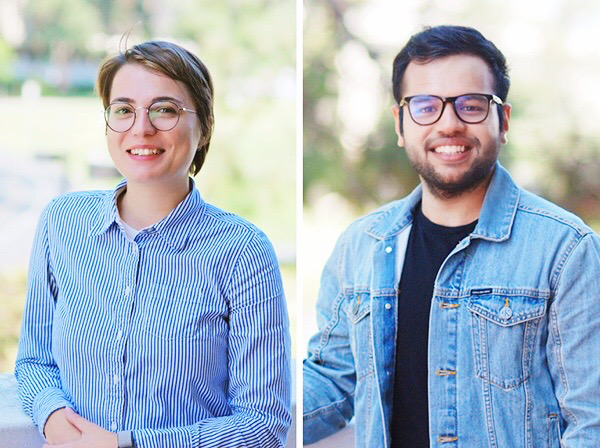MSE Students Celebrate Success at Elevator Pitch Competition

May 8, 2020 – Two materials science and engineering graduate students – Aleksandra Vyatskikh and Devashish Kulkarni – won awards at the fifth annual UCI-Graduate Professional Success (GPS) STEM Elevator Pitch competition held virtually in April.
After attending an elevator pitch workshop led by communication coach Bri McWhorter, contestants submitted a two-minute video describing themselves and their research. UCI-GPS STEM, a program serving both doctoral students and postdoctoral fellows from science, technology, engineering and math disciplines, aims to better prepare scientists for a variety of research careers by empowering them to become skilled researchers and polished professionals.
A doctoral student, Vyatskikh tied for first place, winning a $75 gift card. Her pitch described studying the deficiencies in 3D-printed metal parts and establishing ways to predict and avoid them. 3D printing provides unique flexibility and design opportunities, capable even of producing rocket engine parts. Unfortunately, 3D-printed metal parts often suffer from defects that can ultimately lead to failure.
“I am working on designing new metal alloys specifically for 3D printing,” said Vyatskikh, who seeks to make these alloys resistant to common defects. “It’s been a great honor to be one of the winners, and I highly recommend participating in this competition to all graduate students.”
Kulkarni, a doctoral candidate, earned a $50 gift card for placing second with his pitch about fuel cells. These electrochemical devices convert hydrogen and oxygen into electricity, leaving only water as a byproduct. Kulkarni believes in the need to switch to cleaner energy systems, like fuel cells, in order to combat global warming and environmental damage. His research focuses on material interactions in these cells through the use of an imaging technique called X-ray computed tomography, which provides valuable data about catalyst behavior, gas transport and water formation.
“We can use this information to make materials with enhanced properties, which can improve fuel cells and make them more efficient for widespread use,” said Kulkarni. “I am thankful to GPS-STEM for this opportunity and to Bri McWhorter for her amazing coaching.”
– Megan Lohre
